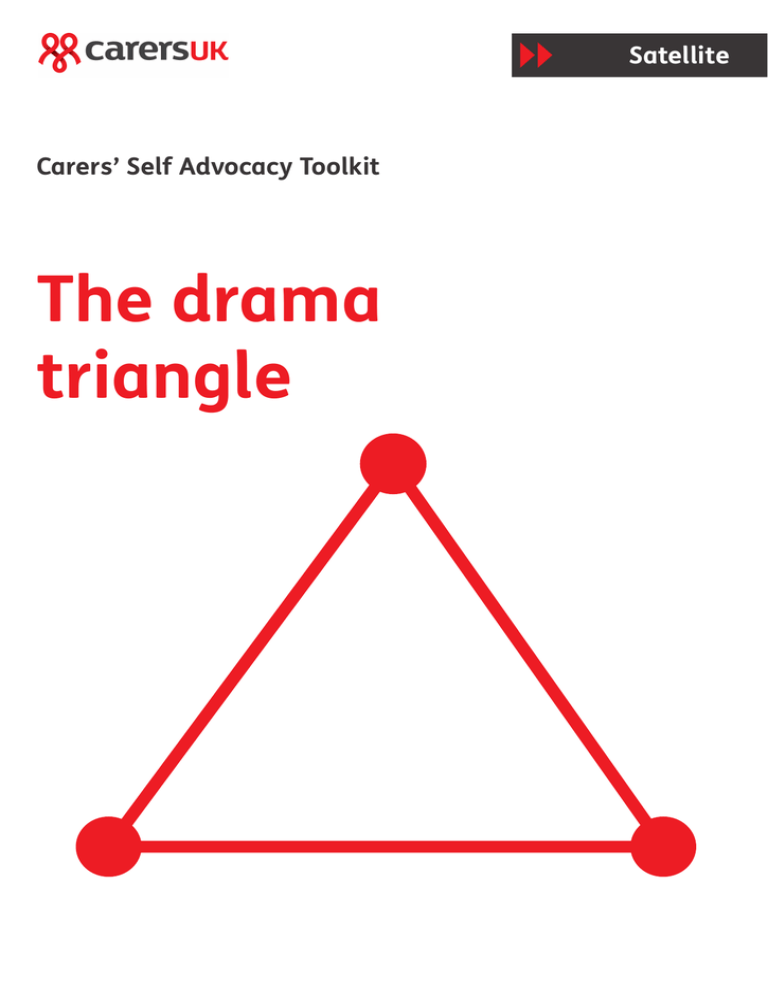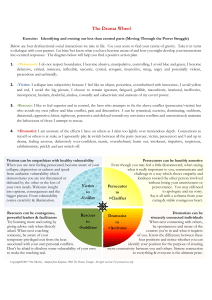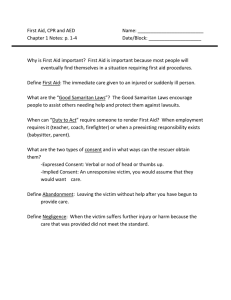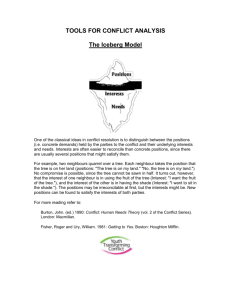The drama triangle
advertisement

Satellite Carers’ Self Advocacy Toolkit The drama triangle The Drama Triangle SATELLITE The Drama Triangle The Drama triangle is used to plot the interplay of power between two people. It was created by a man called Steven Karpman and comes from a theory called transactional analysis created by Eric Berne. Life script Berne’s hypothesis is that people form a “Script” which is essentially an individual’s belief about who they are, what the world is like, how they relate to the world, how the world relates to them, and how others treat them. Some say that an individual forms their script by the time they are four or five. A script is based on what an individual is told, what they experience, and how they interpret these external stimuli from their own internal frame of reference. This can give insight into a person’s thoughts, feelings and behaviour and can be useful in understanding interactions between two people. Persecutor Rescuer Victim 1 A “Rescuer” is someone who seeks to “rescue” those whom they see as vulnerable. The traits of a Rescuer are that they often do more than 50% of the work, they may offer “help” that may not be required. This means that the Rescuer may then often end up feeling “hard done by” or resentful, used or unappreciated in some way. The Rescuer does not take responsibility for themselves, but rather takes responsibility for the perceived Victim, whom they rescue. The Rescuer will always end up feeling the Victim, but sometimes may be perceived by others, who are on the outside looking in, as being the Persecutor. Can be seen as Persecutor Victim Rescuer becomes BEING HEARD: A SELF ADVOCACY GUIDE FOR CARERS The Drama Triangle A “Victim” is someone who usually feels overwhelmed by their own sense of vulnerability, inadequacy or powerlessness, and does not take responsibility for themselves or their own power, and therefore looks for a Rescuer to take care of them. At some point the Victim may feel let down by their Rescuer, or perhaps overwhelmed or even feel persecuted by them. At this stage the Victim will move to the Persecutor position, and persecute their Rescuer. They may even enlist another Rescuer to persecute the previous Rescuer. However, the Victim will still experience themselves internally as being the Victim. Persecutor Rescuer Victim Persecutor Rescuer BecomesBecomes Victim The position of “Persecutor” is synonymous with being unaware of one’s own power. Power used is negative and often destructive. Any player in the “game” may at any time be experienced as the Persecutor by the other player/players. However their own internal perception may be that they are 2 SATELLITE being persecuted, and that they are the Victim. Of course, there are instances in which the Persecutor is knowingly and maliciously persecuting the other person. Persecutor May feel like Rescuer May feel like Victim Each of the positions is adopted as a result them feeling discounted or disowned. To remedy this – How does someone get out of the Drama Triangle? Observe where you are in the triangle during interactions with others. Acknowledge your darker side, that is your nastier behaviours and try and find out what needs they have. Be assertive and ask to be treated with respect The Rescuer needs to take responsibility for him/herself, connect with their power and acknowledge their vulnerability. The Victim needs to own their vulnerability and take responsibility for themselves and also recognise that they have power and are able to use it appropriately. The Persecutor needs initially to own their power, rather than be afraid of it or use it covertly. When an individual is taking responsibility for themselves and allows the other to also take BEING HEARD: A SELF ADVOCACY GUIDE FOR CARERS The Drama Triangle SATELLITE responsibility for themselves, they are adopting an ‘I’m OK, you’re OK’. This is a position of equality in which the responsibility of each individual is acknowledged. It is a position of empowerment and is one of honesty, reality and respect. Boundaries, contracts, accountability and responsibility are all active here. Try the exercise below to see where you have played any of these roles. Think of a situation where you know you have been a Rescuer, Victim, or Persecutor… you might have been all three at some time in the same scenario. Using that situation, ask yourself the following questions. What am I not doing? Want do I need to do? Who is taking responsibility for whom? Who am I taking responsibility for? Am I allowing the other person to take responsibility for their actions? Who has the power? How do I know? Have I agreed to more than I want to do? Am I doing more than half the work? What boundaries do I need to set up? What am I not doing? What do I need to do? Am I using my power to take care of myself properly? What am I feeling about this situation? What would I like to feel? What action do I need to take to make sure that I deal with this in the best possible way so that it has the best possible outcome? 3 BEING HEARD: A SELF ADVOCACY GUIDE FOR CARERS


